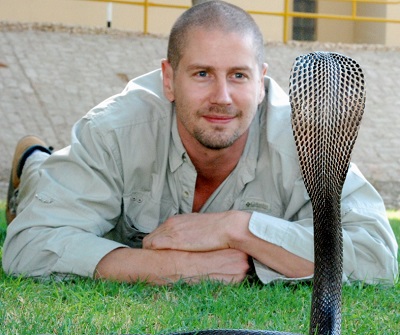
The World Health Organisation has selected a University of Queensland venom researcher to help tackle the global scourge of snakebite – a disease that kills hundreds of thousands, with many more maimed.
Associate Professor Bryan Fry, who has studied snake venom in 40 countries over the last 25 years, has joined a select committee of global experts assembled by the WHO after recognising snakebite as a neglected tropical disease in 2017.
“Snakebite causes tremendous suffering in the developing world, and is the most neglected of all tropical conditions,” Dr Fry said.
“Official snakebite victim numbers are high, but incidences are likely much higher, due to poor-to-non-existent epidemiological records in some of the most affected areas.
“There are a host of reasons why snakebite is still so deadly for so many.
“Many existing antivenoms have never undergone clinical trials, and suffer from numerous issues, including being useful against only a very limited range of species a requirement for constant refrigeration, and high production costs.
“And while envenomations typically occur in rural environments, antivenom supply depots are usually in urban areas due to cold-chain requirements.
“This results in snakebite victims often facing lengthy treatment delays while being transported to antivenom.
“We urgently need rural-deployable snakebite treatment options to field-stabilise patients, which would improve clinical outcomes by decreasing mortality prior to antivenom treatment at a medical facility.”
Dr Fry said the committee’s efforts will prioritise the immediate need for safe, effective, temperature-stable, field-deployable, broad-spectrum treatments for snakebites.
He was specifically selected for his expertise in snake-venom-induced blood clotting, as well as his innovative methods using advanced robotics to investigate the effects of snakebites on clotting.
“Coagulopathy – the disruption of normal blood clotting – is one of the major lethal effects of snakebite envenomations,” Dr Fry said.
“However, the most commonly used methods for research into this venom effect are manual techniques, notoriously inaccurate in determining clotting speed and clot strength.
“Here at UQ, we’ve been pioneering an innovative automated approach to this long-standing problem.
“By using robotic, automated, high-throughput platforms that investigate coagulopathy with precision, these innovative methods can remove the technological bottlenecks that have hampered research in the field.
“It’s all thanks to the Australian Biomolecular Interaction Facility, that I direct, housing $3 million of world-class including the only Octet HTX biosensor in the southern hemisphere.
“This technique has already showed that repurposing enzyme-inhibiting drugs – that are already approved for medical use – may be a viable strategy to alleviate this pressing issue.”
Media: Associate Professor Bryan Fry, bgfry@uq.edu.au, +61 400 193 182; Dominic Jarvis, dominic.jarvis@uq.edu.au, +61 413 334 924.



